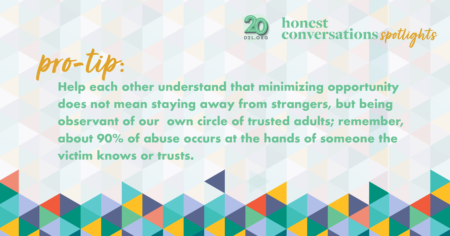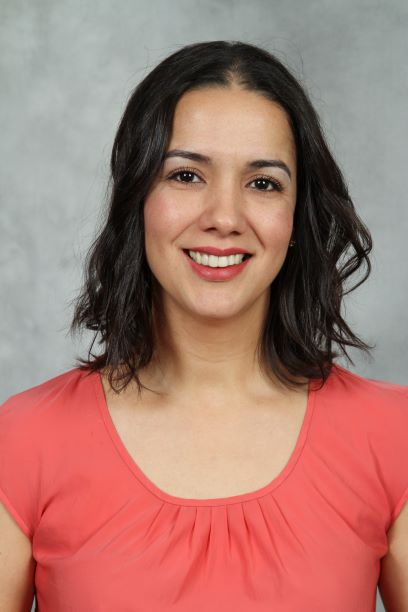This week we chatted with Perla Freed, the Executive Director for the YMCA Guardians for Child Protection, to discuss what advocating for child sexual abuse prevention might look like in Hispanic communities. Perla is an expert in the development, implementation and oversight of policies and practices to create and sustain a safe environment for children. She has a long history of working with organizations to ensure that children are able to live well and without the threat of abuse.
D: How do Hispanic communities talk about child sexual abuse? How do you communicate the importance of prevention?
P: Child sexual abuse is still a taboo in Hispanic communities. Even individuals who have lived in the USA for years still follow the social norms and/or teachings from their home countries. In America, it’s a little more acceptable to be frank or to talk about stigmatized topics. Sometimes that doesn’t carry over for members of other cultures. When I took part in a Spanish child sexual abuse prevention training, it was amazing to watch my fellow trainees realize how prevalent child sexual abuse is in the Hispanic community. One of the most predominant sentiments I’ve heard from other Latinos in response to the call to prevention is the fear of disclosure; they are often afraid to disclose abuse because it could break up an entire family.
I often notice that the Hispanic community feels powerless when it comes to prevention. Intergenerational abuse is so severe that it’s common for individuals to feel and think (based on their own experience) that it’s impossible to prevent. We have to take these fears into account when advocating in the community and tailor the prevention message to address those specific issues. But we can’t advocate well without first becoming comfortable talking about sexual abuse, and talking about it often so others become more comfortable too.
D: How do you raise awareness about child sexual abuse in Hispanic communities?
P: I make sure to leverage every opportunity I get to speak about child sexual abuse. My work with the Catholic Church provided me with several platforms – some of them Hispanic focused – where child sexual abuse was the main topic or part of the overall agenda. I raise awareness through my personal social media engaging family and friends to learn more about child sexual abuse prevention. This is a difficult subject but I do not mind talking about child sexual abuse and how we can all help preventing it. I think this attitude is critical for those advocating in Hispanic communities.
D: What are some ways to get a Hispanic community involved in prevention?
P: We have to determine our community’s barriers first before we can engage them effectively. But, it helps to have relatable individuals relay the message because, like many other cultures, trust is a big component of the way of life. For example, speaking about how to react responsibly to abuse must include the acknowledgement of the differences that exist in household dynamics and how this can create another layer of complexity to reporting abuse appropriately.
D: What are the barriers to belief and action when it comes to sexual abuse prevention?
P: I think one major barrier is that feeling of powerlessness – the belief that child sexual abuse is not preventable and that they cannot speak up. This can be based on several factors such as immigration status, if the abuser is a family member and the victim (and others) are financially dependent on them, or shame around the fact that they’ve been victimized. Reporting might mean going against two important principles in the Hispanic culture: sense of respect and family. There is also just a general lack of knowledge about resources or services that are available for youth and adults.
D: What should advocates understand about approaching this issue in the Hispanic community? 
P: The family structure in the Hispanic community is more extended, including neighbors and trusted individuals and treating them as family. Victims of abuse are shamed, not believed, and even threatened by this broad network of adults and youth. The idea of breaking apart the family or being a “snitch” is sometimes enough of a deterrent to preventing or stopping abuse.
D: Based on your professional experience, what might it look like to minimize opportunity for abuse in a Hispanic setting?
P: First we have to acknowledge the way the Hispanic community defines or views family and trusted people in their circles. Help each other understand that minimizing opportunity does not mean staying away from strangers, but being observant of our own circle of trusted adults; remember, about 90% of abuse occurs at the hands of someone the victim knows or trusts. We have to empower our Hispanic friends to understand that abuse is preventable if adults are vigilant of the people who have access to their children at home, in the community, and even online.
Prevention advocates and initiatives need to take into account the complex factors (including fear, sense of respect, and honor for family) that often characterize Hispanic communities. When we can work with these factors, and remove the shame associated with talking about sexual abuse, we can be effective at advocating in Hispanic communities for child protection.
This is blog #2 of “Honest Conversations: Spotlights,” focusing on the intersection of child sexual abuse in Hispanic communities. Honest Conversations is a Live series from Darkness to Light where experts have a variety of authentic discussions about the realities of stigma and child sexual abuse. Click here to read Blog 1 in this series and here to register for the live discussion.

Perla Freed is the Executive Director for the YMCA Guardians for Child Protection, a group of Y CEOs committed to Child Protection with the Y Movement and other youth serving organizations. Perla comes from the Archdiocese of Atlanta where she oversaw the development, implementation and oversight of new policies and practices to create and sustain a safe environment for children. She provided leadership to staff and volunteers in this area to provide protection against child abuse by ensuring the adoption of these new proven practices. Perla’s work included abuse prevention training for over 5,000 employees and more than 70,000 Diocesan volunteers.
Perla earned a bachelor’s degree in Accounting/Finance from Georgia State University and, more recently, a Diploma Certificate in Safeguarding Minors from the Pontifical Gregorian University in Rome, Italy. She represented not only the United States but Latin America as well in a group of 18 students – mostly religious- from all over the world. Prior to her important child protection role, she worked in accounting and finance and as a business manager for the Archdiocese and private sector firms.
Perla’s role with the YMCA Guardians includes refining and scaling a peer review assessment process, promoting community engagement on this topic through local Ys and developing and monitoring child sexual abuse plans with all Ys. In her evolving role, she will work under the direction of the Guardians and will coordinate with YUSA’s risk management and child protection work.
Follow us on social media to stay up to date and join the conversation.


